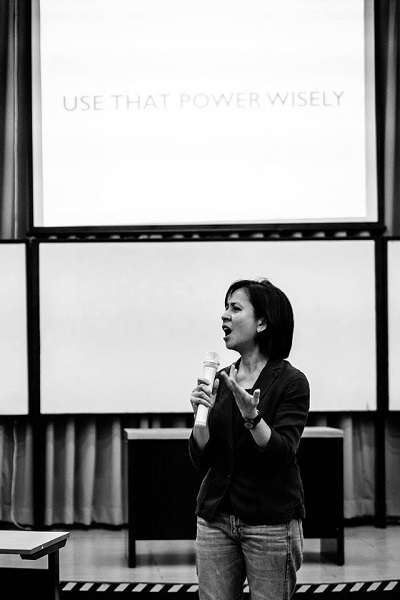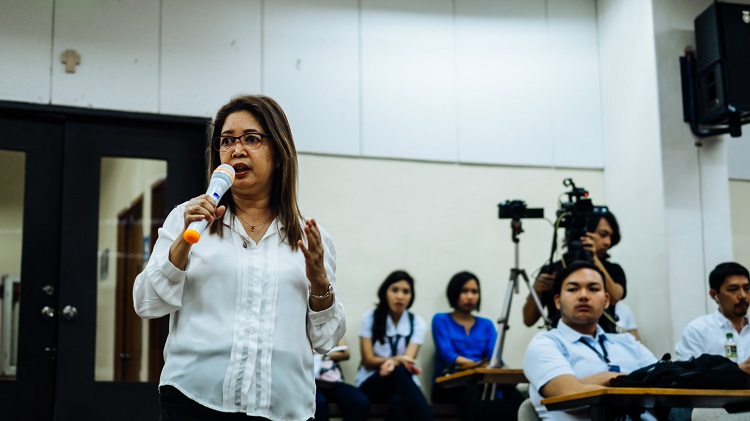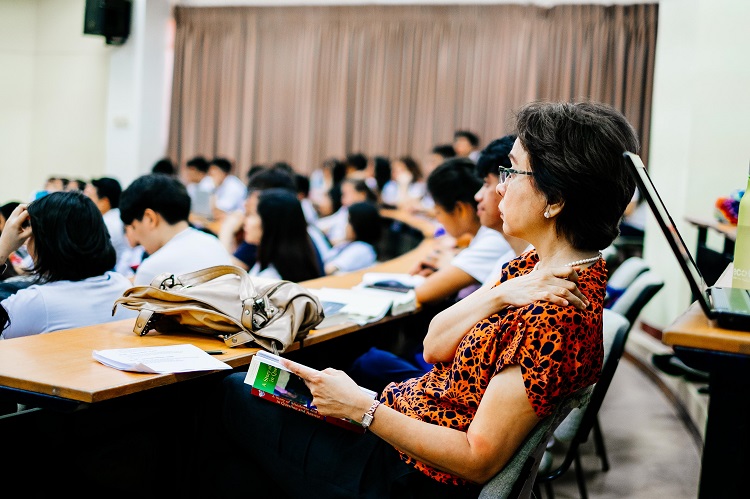 "Hugot is something we have to discover; it’s not something that [one finds] upon waking up in the morning."
"Hugot is something we have to discover; it’s not something that [one finds] upon waking up in the morning."
Text by Stephen J Pedroza
All photos by David T Roa
CAGAYAN DE ORO CITY, Philippines —“Saan ba dapat manggagaling ang hugot para umaksyon ang kabataan?”
(From where should the youth draw the passion to act?)
This question was posed as a major challenge to the youth during CDO’s #TheLeaderIWant forum at Xavier University - Ateneo de Cagayan on December 10 organized by social news network Rappler in partnership with XU’s Development Communication Department.
The term hugot has recently gained prominence on social media and in daily slang to mean a realization that results from harking back to a memorable — often melancholic — experience.
But in youth activism towards social and political issues, hugot has a slew of other meanings.
[BEYOND NUMBERS. Rappler’s investigative desk head Chay Hofileña tells the audience at #TheLeaderIWant forum at Xavier University that elections are not just about who wins or loses but more importantly, the May 2016 polls should be about choosing the right leaders who can usher a brighter future for our country.]
Looking for ‘hugot’
“There’s a certain type of complacency among our youth today,” related DevCom professor Dr Ma Theresa Mendoza-Rivera. “I’m saying this to challenge you [the present generation] because you live in a world where there is ‘no urgency or no pressure,’ unlike what we had during the ‘70s with Martial Law, which put us under repression.”
A graduate of DevCom from the University of the Philippines - Los Baños and a teacher for over 30 years, Rivera observed that “too much democracy” has resulted in a lack of hugot to act collectively in resolving social woes and instigating inclusive change. She emphasized the need to cultivate the consciousness to appreciate the role of youth activism in the restoration of freedom, as one of the foundations of the First People Power Revolution, and to use the free speech to contribute answers to our nation’s struggles.
“We live in a world now where there is too much democracy. What I’m saying is that kulang tayo sa hugot. Saan ba dapat manggaling ang hugot para umaksyon tayo doon sa mga sinasabi nating problema ng lipunan? Kailan ba dapat natin sabihin ‘yung kailangan natin sabihin?”
(We lack the spirit to act. From where should the youth draw the passion to resolve our societal issues? When should we say the things we need to say?)
Rivera added, in her well-applauded sharing during the forum, that the youth now has a lot of tools and spaces to express themselves so why not use them to give voice to the marginalized and to put their energies to good social use.
“For over 30 years I have been teaching students. I argue with them as to why they are not putting their energies into ‘proper platforms.’ You go to Facebook, to social media, to the Internet where you can share your voice,” she opined.
On a positive note, Rivera imparted local experiences where the millennials have shown how the new media can make a difference, such as during the aftermath of Sendong where the Ateneans served as volunteers during the relief and rehabilitation effort, as well as in building the Sendong website where monetary and in-kind donations were closely monitored.
“I don’t know what it takes para magising ang mga kabataan (for the youth to wake up) but I’m just putting it as a constant challenge,” Rivera said.
In a contemporary setting, XU Economics instructor Jhon Louie Sabal argued that it is difficult to generalize the source of hugot among the youth to be involved in the present issues of our country.
“Hugot is something we have to discover; it’s not something that [one finds] upon waking up in the morning,” he said.
“There is no finite model that would tell us where to find hugot. ... I’d like to emphasize the importance of social media and the role of the academe in making the students participate in [resolving our social issues].”
“I think what we lack here is not the hugot, but the platform where we can express our energies as the young generation of this society,” said Joseph Roldan Tagalog, president of the Central Student Government of XU.

[WHAT'S YOUR HUGOT? XU Development Communication professor Dr Ma Theresa Mendoza-Rivera highlights the importance of looking for "hugot" among the youth — especially those who have grown apathetic to the country's present struggles — to participate in crafting sustainable solutions.]
Voices of the youth
The youth has an important role to play in determining the country’s future especially as the national and local elections draw near.
During the open forum of #TheLeaderIWant, XU students expressed how they are able to galvanize their awareness on different issues into action through social media, and the qualities they look for in those who are gunning for political seats in the May 2016 polls.
Other participants added that social media plays a crucial role in improving engagements with other communities, in exacting accountability and better social services, and in determining the leaders they want to place on government seats.
Nor-Jamal Batugan, president of the sole Islam religious organization at XU called "Sira’j," said that he turns to online portals to scrutinize the platforms of the politicians whom he thinks can push for the peace process in the Bangsamoro’s quest for self-determination and economic inclusiveness.
In a leader, Batugan looks for someone who is yearning for peace, “Considering the life of the Maranaos, they live everyday seeing killings, kidnappings. All I want is for them to enjoy the same peace and order that I experience here in Cagayan de Oro.”
Agreeing to Batugan’s “peace” model of a leader, Ernesto Neri, a fourth year Xavier Law student and chairman of the Oro Youth Development Council (OYDC), said that the country’s leadership requires someone “who can inspire people” and who knows how to reach out with his development agenda to the people, especially in the grassroots communities.
(RELATED READ: #PHVote CDO: More youth getting involved with election issues)

[VOTE WISELY. XU faculty, students, youth leaders and representatives from various civil society organizations join in the #PHVote challenge in Cagayan de Oro aimed at engaging the Kagay-anons on the different societal issues and to be better informed in selecting the next set of leaders who will run the national and local governments.]
Reaching CHAMP elections
In May 2016, there will be more than 18, 000 positions to be filled up across the country and according to Comelec figures, close to 20% of the 52M registered voters are from the youth sector.
Based on the October 2013 barangay elections, there were some 285, 645 voters who registered in CDO, the capital of Misamis Oriental and as of July 2015, the province has 800,000 registered voters. Having the monikers as the “Gateway to Mindanao” and “City of Golden Friendship,” CDO also serves as the central business hub of Region 10 (Northern Mindanao), the second most vote-rich region in Mindanao with 2.46M registered voters.
But the presentation of Rappler’s investigative desk head Chay Hofileña showed that “Elections are not just about numbers. They are about issues — issues that will determine where our country is headed.”
The youth votes can make a huge difference in the victory of a political aspirant especially in the local election’s tight races. Hofileña underscored six major issues, which can be used by the young voters to evaluate their bets for different public offices: fight against corruption, climate change, alleviating poverty, peace in Mindanao, overseas Filipino workers, and foreign policies.
Rappler and XU speak the same language when it comes to the urgency of discussing and unravelling the said pivotal and intertwined development issues as part of the university’s Research and Social Outreach thematics.
“We would really like to go into real discussions on the many serious issues and challenges that our country faces,” XU president Fr Roberto “Bobby” Yap SJ said in his message to the social media-savvy audience. “We should choose our leaders wisely, the leaders that we want and hopefully, the leaders who can really address these serious concerns our country faces, our city faces.”
“For the first-time voters, I hope you find these upcoming elections interesting and you’re excited to exercise your right and your responsibility to vote as citizens.”
As a non-partisan university, XU forms part of the Lambigit Igsoon para sa Hiniusang Pag-uswag sa atong Katilingban 2016 (LIHUK), a multisectoral network of concerned and active electoral advocates in CDO, with members coming from the church, civil society organizations, academic institutions and neutral government agencies. LIHUK, which also means “act” or “move” in Bisaya, calls for “Barug Kagay-anon alang sa tiunay nga piniliay” (Stand up, Kagay-anon, for truthful elections).
CDO is also set to host the first presidential debate on February 21, 2016; however, the exact venue is yet to be announced.
“Xavier supports this particular project that Rappler is doing because we have declared that it is following the advocacy of [CDO] Archbishop Tony Ledesma who would like [various sectors] to come together to work for CHAMP elections: clean, honest, accurate, meaningful and peaceful,” Yap continued.
#TheLeaderIWant forum in CDO encouraged the audience to take the #PHvote challenge of being better informed and ripple substantial pieces of information among their virtual or personal circles so the imminent elections will resonate the CHAMP process and results.